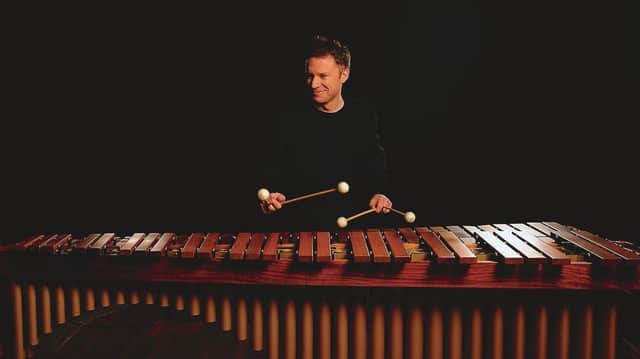Live classical music returns to Scotland (sort of)


It’s official: next week, live classical music returns to Scotland. OK, the four lunchtime concerts arranged by BBC Radio 3 in Glasgow’s City Halls will take place behind closed doors, with no live audience in the venue. But you’ll be able to experience the music – from locally based performers including pianist Steven Osborne, percussionist Colin Currie and harpsichordist John Butt – remotely, live on BBC Radio 3, or for a month afterwards on BBC Sounds.
It’s an encouraging sign, of course, and an indication that we’re on a path to – well, we’ll see where we end up. “I think Radio 3 has to do whatever it can to bring live classical music back,” says the network’s controller Alan Davey, who has just overseen a hugely successful similar series from London’s Wigmore Hall. “While we were planning the Wigmore concerts, we thought: can we do something similar elsewhere? City Halls has a broadcast control room and an easy connection to the network, and our colleagues in Scotland worked hard to make it happen.”
Advertisement
Hide AdAdvertisement
Hide AdDavey admits, however, that it’s still a learning experience. “We’ve proven what we can do under current guidelines. This will be our second big project. The next stage will probably be the Proms in late August and September, with orchestras playing together in a socially distanced way.”
And despite their inevitable compromises and restrictions, the City Hall concerts feel like a very significant moment for Scottish music. “On a personal level, it’s a great honour to be asked to be part of them,” says Edinburgh-born percussionist Colin Currie. “As always, with percussion, there’s an extra layer of logistics, expense and probably red tape, so I’m grateful that the BBC did call me in.”
One of those extra logistical layers concerns the instruments that Currie will be playing. “It’s all my own equipment,” he explains, “and there’s a way of getting it into the hall cleanly and safely – the safety regulations have been explicitly factored in right from the start.” His wide-ranging recital on 17 July brings together classic percussion works by Xenakis and Stockhausen with more recent music by Kevin Volans and Bryce Dessner, plus a UK premiere from Finnish master Kalevi Aho. “The marimba will be front and centre, and there are three pieces on unpitched instruments, plus a vibraphone solo, so I’ve mixed up the sounds in the concert as well.”
Also tackling instrumental challenges is John Butt, who appears alongside tenor Thomas Walker in arias by Handel and keyboard music by Bach and Purcell on 16 July. “I’m bringing in two different instruments: a harpsichord and a little organ,” Butt explains. “There’s a complicated process whereby I’ll deliver them to the back door at City Halls, and they’ll be picked up and moved into the hall, and then someone will tune the harpsichord.” How does he plan to arrange preparations with Walker, given current constraints? “We’ve both been going into City Halls to rehearse with social distancing,” he explains. “We’ve got allotted times when other performers won’t be rehearsing – it’s a complicated timetable.”
Both performers admit a slight sense of trepidation, after three months away from what’s usually a busy performance schedule, and also because of the concerts’ unusual set-up. “I’ll miss a live audience,” says Currie. “And on a more vulnerable side, I feel slightly apprehensive about standing in a large hall with nobody else there, performing live. Psychologically it’s going to be a learning curve.”
Indeed, Davey is aware that Radio 3’s responsibility to live music applies to performers and composers as much as it does to listeners. “I see it as our job to help sustain all musicians through this period, because people have got to keep playing and composing, and the audience is desperate to hear things.”
Butt has one last reminder, however, that these concerts can only be stepping stones to more ambitious events. “There will just be the two of us on stage, but we could have performed the same music with an ensemble of 30 or so. So it needs to sound inadequate in a sense – we don’t want it to sound like it should always be played like that, or send the message that we don’t need to use big groups of musicians any more.”
Advertisement
Hide AdAdvertisement
Hide AdBBC Radio 3’s lunchtime concerts will be broadcast live from Glasgow’s City Halls from 14-17 July at 1pm, and will also be available for 30 days on BBC Sounds. Colin Currie will play at City Halls on 17 July
A message from the Editor:
Thank you for reading this story on our website. While I have your attention, I also have an important request to make of you.
With the coronavirus lockdown having a major impact on many of our advertisers - and consequently the revenue we receive - we are more reliant than ever on you taking out a digital subscription.
Subscribe to scotsman.com and enjoy unlimited access to Scottish news and information online and on our app. With a digital subscription, you can read more than 5 articles, see fewer ads, enjoy faster load times, and get access to exclusive newsletters and content. Visit https://www.scotsman.com/subscriptions now to sign up.
Joy Yates
Editorial Director